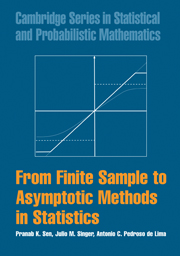Book contents
- Frontmatter
- Contents
- Preface
- 1 Motivation and Basic Tools
- 2 Estimation Theory
- 3 Hypothesis Testing
- 4 Elements of Statistical Decision Theory
- 5 Stochastic Processes: An Overview
- 6 Stochastic Convergence and Probability Inequalities
- 7 Asymptotic Distributions
- 8 Asymptotic Behavior of Estimators and Tests
- 9 Categorical Data Models
- 10 Regression Models
- 11 Weak Convergence and Gaussian Processes
- Bibliography
- Index
11 - Weak Convergence and Gaussian Processes
Published online by Cambridge University Press: 05 June 2012
- Frontmatter
- Contents
- Preface
- 1 Motivation and Basic Tools
- 2 Estimation Theory
- 3 Hypothesis Testing
- 4 Elements of Statistical Decision Theory
- 5 Stochastic Processes: An Overview
- 6 Stochastic Convergence and Probability Inequalities
- 7 Asymptotic Distributions
- 8 Asymptotic Behavior of Estimators and Tests
- 9 Categorical Data Models
- 10 Regression Models
- 11 Weak Convergence and Gaussian Processes
- Bibliography
- Index
Summary
Introduction
The general asymptotics presented in Chapter 6 and 7 play an important role in large sample methods in statistical inference. Yet, there are some asymptotic methods in statistical inference that rest on more sophisticated probability tools developed mostly in the past forty years, albeit most of these sophisticated tools are beyond the reach of the contemplated level of this text. We therefore take an intermediate route, introduce the basic concepts in these weak convergence approaches in less abstract ways, and emphasize on their fruitful statistical use. Among the stochastic processes entering our contemplated coverage, there are a few ones that are most commonly used in statistical inference:
(i) Partial sum processes;
(ii) empirical distributional processes; and
(iii) statistical functionals.
In order to treat them in a unified way, there is a need to explain how the weak convergence results in Chapter 7 have led to more abstract but impactful weak invariance principles (Section 11.2). Section 11.3 deals with partial sum processes, and Section 11.4 with empirical processes. Section 11.5 is devoted to statistical functionals. Some applications of weak invariance principles are considered in Section 11.6. In particular, some resampling plans (e.g., jackknifing and bootstraping) are appraised in the light of these weak invariance principles the embedding of the Wiener process is outlined in Section 11.7. Some general remarks are presented in the last section.
- Type
- Chapter
- Information
- From Finite Sample to Asymptotic Methods in Statistics , pp. 338 - 374Publisher: Cambridge University PressPrint publication year: 2009



